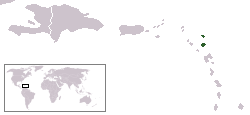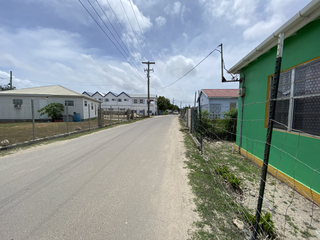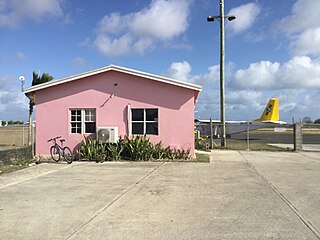
Antigua and Barbuda is a sovereign island country in the West Indies. It lies at the conjuncture of the Caribbean Sea and the Atlantic Ocean in the Leeward Islands part of the Lesser Antilles.
The history of Antigua and Barbuda covers the period from the arrival of the Archaic peoples thousands of years ago to the present day. Prior to European colonization, the lands encompassing present-day Antigua and Barbuda were inhabited by three successive Amerindian societies. The island was claimed by England, who settled the islands in 1632. Under English/British control, the islands witnessed an influx of both Britons and African slaves migrate to the island. In 1981, the islands were granted independence as the modern state of Antigua and Barbuda.

Barbuda is an island located in the eastern Caribbean forming part of the twin-island state of Antigua and Barbuda as an autonomous entity. Barbuda is located approximately 30 miles (48 km) north of Antigua. The sole settlements on the island are Codrington and its surrounding localities. Barbuda is a flat island with the western portion being dominated by Codrington Lagoon, and the eastern portion being dominated by the Barbuda Highlands, with salty ponds and scrubland spread throughout the island. The climate is classified as tropical marine.

The following is an alphabetical list of topics related to the nation of Antigua and Barbuda.

Codrington is the only major settlement on the island of Barbuda, which is part of the country of Antigua and Barbuda. Codrington coincides with the Major Division of Codrington, one of the two major divisions on Barbuda. Codrington lies on the Codrington Lagoon, and is the northernmost major settlement in the country. As of 2011, Codrington had a population of 796 people.

The statistics for Islam in Antigua and Barbuda estimate a total Muslim population of about 200, representing 0.3 percent of the total population of 67,448. Most of the Muslims of the islands are Arabs of Syrian or Lebanese descent. There are two known Islamic organizations in St. John's, including the Antigua and Barbuda International Islamic Society and the American University of Antigua Muslim Students Association. There is also an Ahmadiyya mission in Antigua. Outside St. John's, there is the Muslim Community of Antigua and Barbuda in Codrington, Barbuda. A Pew Research Center survey in 2016 calculated the total number to be around 950.

Barbuda Codrington Airport is a public airport serving the village of Codrington, on the island of Barbuda. It has a very short runway.

Betty's Hope was a sugarcane plantation in Antigua. It was established in 1650, shortly after the island had become an English colony, and flourished as a successful agricultural industrial enterprise during the centuries of slavery. It was the first large-scale sugar plantation to operate in Antigua and belonged to the Codrington family from 1674 until 1944. Christopher Codrington, later Captain General of the Leeward Islands, acquired the property in 1674 and named it Betty's Hope, after his daughter.
Christopher Bethell-Codrington was a British politician, planter and amateur cricket player who served as a MP in the British Parliament.

Antigua and Barbuda lie in the eastern arc of the Leeward Islands of the Lesser Antilles, separating the Atlantic Ocean from the Caribbean Sea. Antigua is 650 km (400 mi) southeast of Puerto Rico; Barbuda lies 48 km (30 mi) due north of Antigua, and the uninhabited island of Redonda is 56 km (35 mi) southwest of Antigua.
Antigua was discovered by Christopher Columbus, in 1493, and was named after the church of Santa Maria la Antigua in Seville. It was first settled in 1632. By the Treaty of Breda in 1667 it became a British Possession.
The 1905 Birthday Honours for the British Empire were announced on 30 June, to celebrate the birthday of Edward VII on 9 November.
The New Year Honours 1892 were appointments by Queen Victoria to various orders and honours of the United Kingdom and British India.

John James, was an attorney and resident manager of the Caribbean estate of Christopher Bethell Codrington, on the Island of Barbuda 1805-1826.
The 1941 New Year Honours were appointments by King George VI to various orders and honours to reward and highlight good works by citizens of the United Kingdom and British Empire. They were announced on 31 December 1940.
Colonel Christopher Codrington was a Barbadian-born planter and colonial administrator who served as the governor of the Leeward Islands from 1689 to 1699.
Sir William Codrington, 2nd Baronet (1719–1792) was an English politician who sat in the House of Commons between 1747 and 1792.
The Barbuda Land Acts establishes that the citizens of Barbuda communally own the land. The act specifies that residents must provide consent for major development projects on the island. The Government of Antigua and Barbuda passed the act on January 17, 2008.

Squatting in the island country of Antigua and Barbuda in the West Indies is the occupation of unused land or derelict buildings without the permission of the owner. Historically, native Barbudans were seen as squatters and after Hurricane Irma in 2017, Prime Minister Gaston Browne offered people he termed squatters the chance to buy their land.









